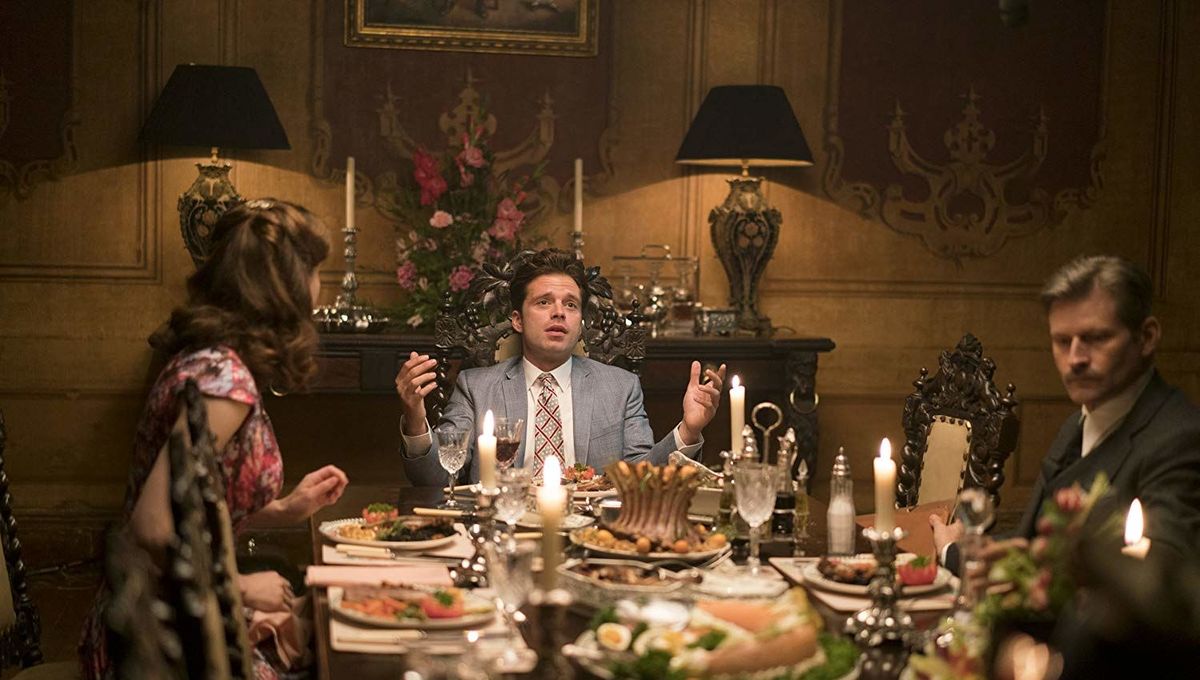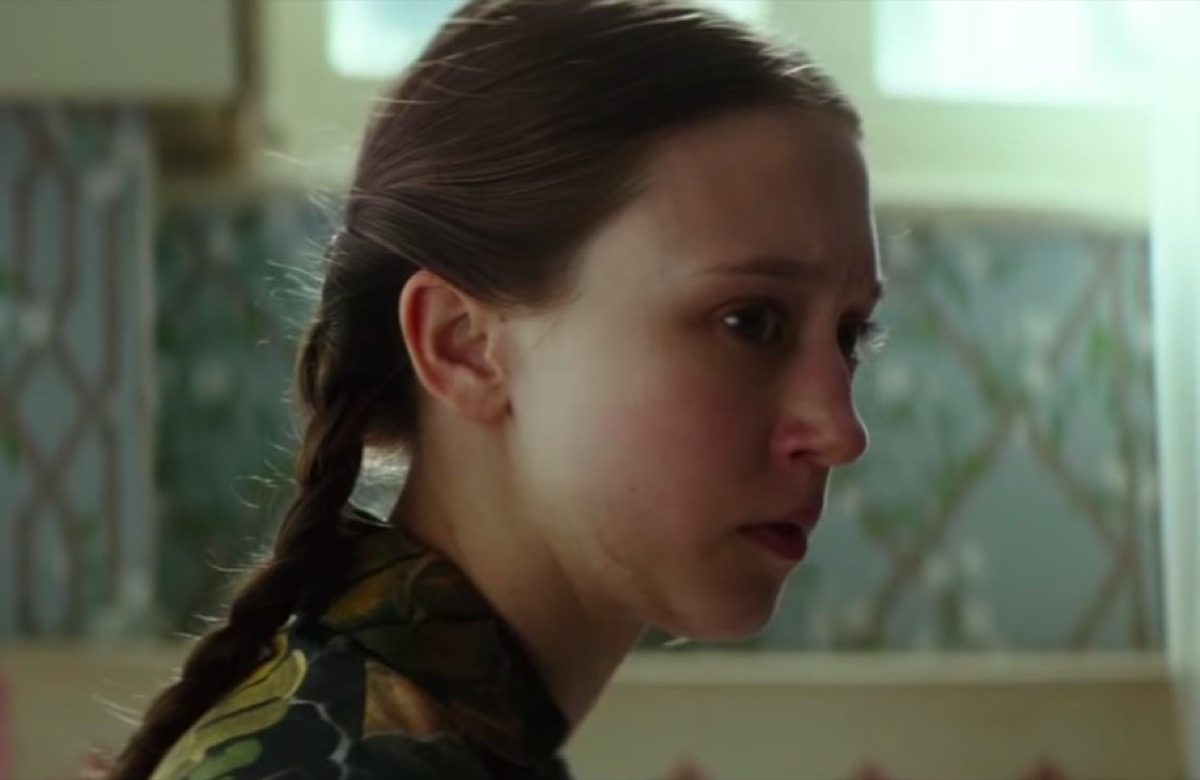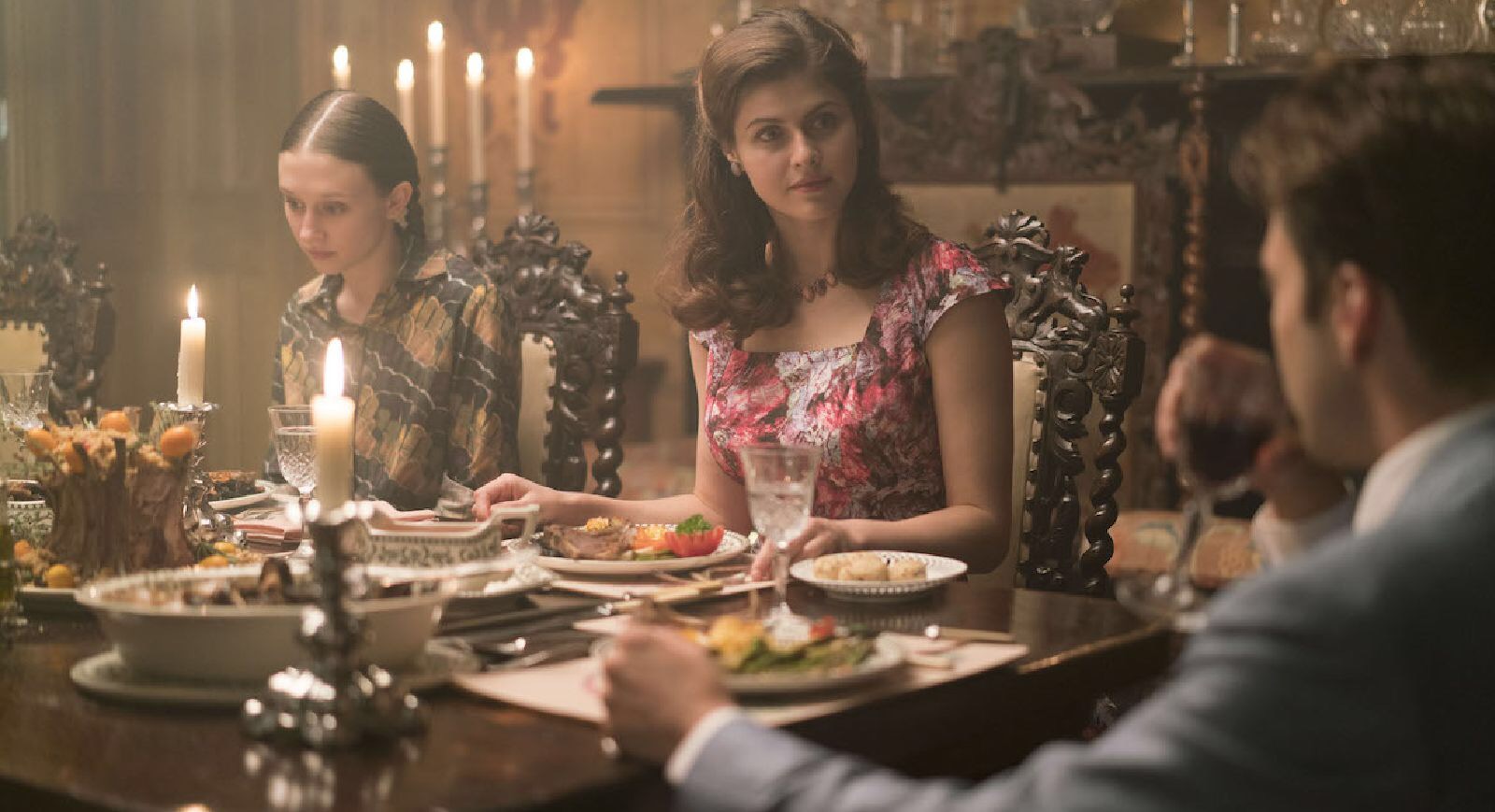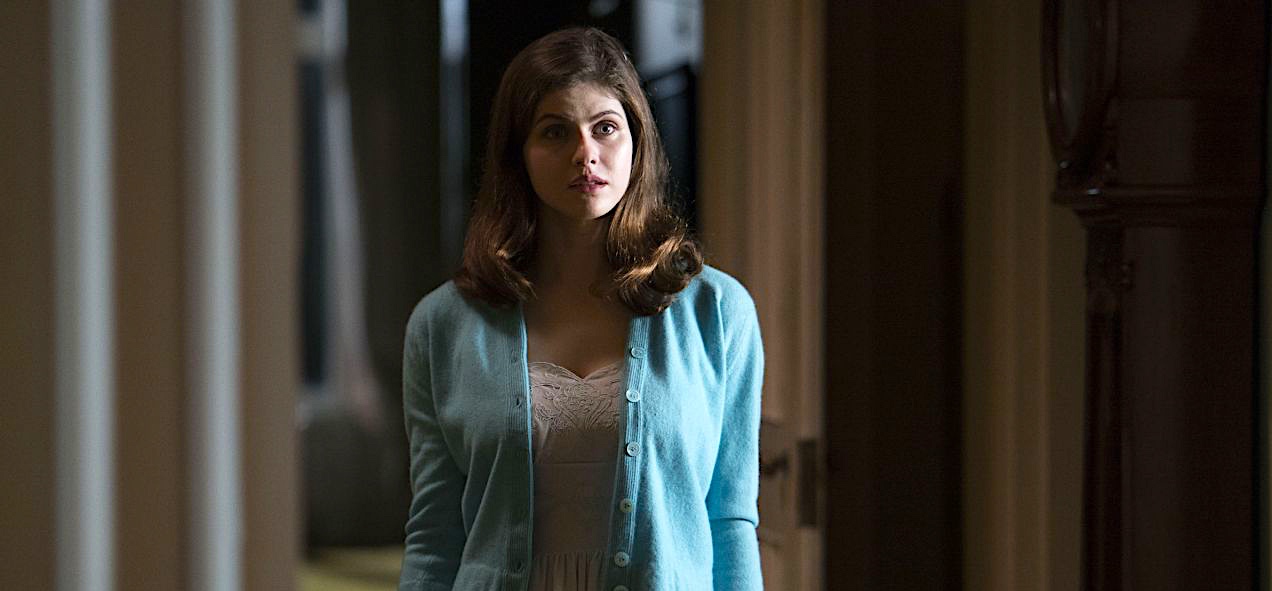‘We Have Always Lived in The Castle’ tells the story of the Blackwood sisters who live in their house on the hill, away from the resentment and hatred of the people in the town. Their history is marred with tragedy and the world hasn’t made anything easier for them. They keep to themselves and try not to get into any trouble. But what happens when trouble comes looking for them? The entry of a distant cousin in their lives kickstarts a chain of events that lead to death and destruction and the revelation of some dark secrets. If you haven’t yet seen the film, you should bookmark this page and come back later.
SPOILERS AHEAD!
What Happened to the Blackwood Family?

As the camera advances through the dilapidated Blackwood Manor, Merricat’s (Taissa Farmiga) voice rings in the charred remains of her house and we are introduced to the Blackwood sisters. Evidently, they are the only surviving members of their family. The parents died a couple of years back, and a newspaper clipping tells us that Constance, the older one, had been arrested for it. However, the jury let her go.
As the story moves forward, we discover exactly how they had died, and have our suspicions about who actually did it. But it is the “why” that nags at us the most. Constance (Alexandra Daddario), who is hated by the whole town so much that she has stopped stepping out of the house, is the prime suspect. We try to read into her optimism and the smile that she sticks on her face, no matter what the situation, is disconcerting at times. She certainly has some issues, but she is not the one that people should be afraid of. It is Merricat.
Looking and acting like a twelve-year-old while being an eighteen-year-old girl, Merricat actively practices witchcraft and uses it all the time to keep her sister safe. We think that Constance has been looking out for her sister, but all this time, it is Merricat who has been protecting her. Six years ago, the Blackwood family sat down for dinner. All except, Merricat. She did something outrageous (we don’t know what) and for her punishment was constrained to her room and deprived of dinner.
However, she had already put her plan in motion by then. She put the arsenic, that her sister had brought to kill the rats, in the sugar. She knew Constance would be safe because she doesn’t take sugar. Her parents and her aunt took a good amount and died. Uncle Julian took it sparingly, and as a result, survived to tell the tale. However, he suffered severe physical and mental trauma.
The cops immediately suspected Constance, because, according to them, Merricat was just a child to pull off something like this. Moreover, she was the only one who sat down for dinner and didn’t choke on her food. Constance immediately figured out that it was her sister who did this, but her maternal instincts didn’t allow her to speak of it to anyone.
In fact, her first reaction was to clean the bowl in which Merricat had put the poison. She took the blame on herself, but was acquitted by the jury, partly because she really was innocent and the case against her wasn’t so strong, and partly because she was “too well-bred to be put into prison”. However, being cleared by the law doesn’t mean she is off the hook. The whole town hates her now, as well as her sister, and they are confined in their family home, taking care of their paralysed uncle.
Why Did Merricat Kill Her Family ?

Now that we know the “who”, we should focus on the “why” of the case. Why would a young girl want to kill her parents? What could possibly drive her to do such a thing? There are a number of theories regarding this, but two of them make the most sense.
The first explanation is that their father had been abusing them- physically or sexually. We never get a proper confirmation of this; the exact words are not spoken in the film. But we do get the sense that the father was a “wicked” man. He was certainly a stern person and, from the looks of it, had both the girls under his thumb, especially Constance. She was a complaint girl who would easily give in to any male authority around her.
Even though she would smile all the time, we can easily see the struggle she has to put up to hold it on her face. She has been taught to live like a woman who doesn’t speak much, who is good at all the chores, and who does what she is told. Though this could be the normal upbringing of her family, there might also have been some hurt involved here. Either her father would physically punish her for small mistakes (hence the want for perfection), or he had been molesting her.
When Merricat lingered on the boundary of puberty, he turned his attention towards her. He must have already been using brute force to discipline her, but now, he took it a step further. While Constance was the kind of person who could silently endure her pain, Merricat is the one who would shout and scream and fight back. And maybe, that’s exactly what she did. She told her mother, or maybe her aunt, about it. It could be that they asked her to keep quiet. Perhaps, instead of helping her, they asked her to go along with it. Perhaps, that’s what they had done with Constance too. But Merricat is not the person you can simply console and ask to make peace with everything. When she came to know that her sister had been going through the same thing, she decided to do something about it.
Now, there are two ways in which the events could have unfolded. Because she had created a ruckus, her father punished her by locking her in her room. But before that, she somehow managed to get her hands on the arsenic and poured it on the sugar that she knew everyone, except Constance, would consume. Or, she planned it. She bided her time and chose which poison would be best to do the deed. She didn’t use any garden herbs because that would easily shift the blame on Constance.
When she saw the arsenic brought in the house, she mixed it with sugar, then created a scene, following which she was thrown into her room. At the end of the film, Constance reveals that she knew it had been Merricat all along. She says that their father was a wicked man and that Merricat saved her. Though she doesn’t use the exact words, we can infer their meaning.
Another explanation for why Merricat killed her parents is that she is simply a psychopath. In her first lines, she makes it clear that she has no grief for her dead family and only cares about her sister. While her parents were still alive, she didn’t mingle with the townsfolk, and as a result, had no friends. She grew up with her father’s belief that everyone outside the manor was beneath them. Her father might not have been molesting them, but he surely was a strict man. In a number of instances, she quotes her father, and we realise that she agreed with him on a lot of things.
So, maybe, she didn’t really hate him, until, he did something to her sister. Perhaps, he beat up her, and Merricat didn’t like that, and because no other adult stood up against him, she decided it was time for all of them to hit the grave. But that is not the end of it. No kid likes their sibling being treated harshly, but they don’t go around killing their parents. For a twelve-year-old girl to do something like this, there needs to be the presence of malice in her heart. If the decision to kill four people was so easy for Merricat, then she must be a psychopath. There are a couple of incidents that back this theory.
Remember that Merricat’s mother and aunt had been arguing before dinner? We never get to know why, and because we only come across this information because of Julian’s constant mumbling, we don’t take it so seriously. They were bickering, so what? But give it some thought and you wonder if it had something to do with Merricat. Maybe, her aunt recognised her psychopathic tendencies and wanted her to be sent to a mental hospital, which would have been an asylum in those times. Her mother didn’t want that and was angry with the aunt for saying such a thing.
The arguing could also be related to the sexual molestation theory. Julian uses the word “delicate” to describe their mother, in one scene. Maybe, when Merricat told her about what their father was doing to them, she asked her to comply, just as her sister. But when their aunt came to know about it, she was infuriated and wanted their mother to stand up for them.
Or Is She A Ghost?
In one of the scenes, when Charles (Sebastian Stan) is shouting on Merricat for destroying his room and Constance is trying to calm him down, Uncle Julian says that Merricat had died in an orphanage when Constance was on trial. Charles dismisses this because he thinks Julian is crazy and should be put in a hospital. But we find it hard to let go of.
Why did Julian say that? We know that he isn’t entirely sane at this point. He tends to go back to the night that the murders happened and often confuses Charles for his brother. But that doesn’t mean that what speaks in this state is a lie! If what he said is true, then it changes everything. Is Merricat really a ghost? Or is she a witch who resurrected herself? Ghosts are generally tied to something, the one thing that keeps them bound to this realm.
Maybe, Constance is her tether. Maybe, this is why she doesn’t want to leave her, even if it is to go to town and get supplies. But then, for a whole town to see a ghost doesn’t seem right. Then again, who knows how this ghost thing works? Maybe they never come to know about her death, which is why they can see her! I don’t want to meaninglessly exaggerate this, so we can also turn towards the theory that she had been a practising witch for a very long time, and maybe she was strong enough to cast a resurrection spell for herself! Or maybe, Uncle Julian really did lose his mind and said something that wasn’t true!
The Ending: Are the Blackwood Sisters Happy?

After their house is eaten away by a blazing fire, and they barely survive the wolfish behaviour of the townsfolk, the girls return to their house the next morning. They come to know about Uncle Julian’s funeral, and several people knock on their doors for an apology and leave food for them outside. Charles shows up again but is killed by Merricat when he tries to forcefully talk to Constance. They bury him in the backyard, hide his car and go about their business. In the final scene, after scaring away the boys, the sisters have a little conversation about eating children, and Constance walks away after telling Merricat that she loves him. The younger sister looks at her with an expression on her face that spells relief, satisfaction and intense love, all at once.
We know that Merricat was highly protective of her sister, and maybe, now she is relieved that all the troublesome men are out of their lives. But I am tempted to believe that there is something more here. One of the things that make me wonder why Merricat killed her family, about her motivation to take such a drastic step, is her love for Constance. Had her attachment turned into an obsession? Did she want her sister all for herself and got rid of everyone else in her life, the people who could separate them? For example, when she came to know about her affair with Jim and that they were planning to run away together, she snitched to her father.
Now, if the girls were being abused by their father, why wouldn’t Merricat want her sister to escape? Why wouldn’t she want her to be with someone who could take her away from this? In fact, she could have run away with them! Why did she close that door? Maybe because she saw Jim as a threat. She didn’t want him to come between them. This is also why she didn’t like Charles the moment he entered their house. Of course, he was no saint either. But he was being good to Constance, in the beginning. He wanted to please all of them. Merricat didn’t fall for it because, one, she has killer instincts about people, and two, she saw him as a threat.
In any case, the sisters are left alone now. The hatred inside the townsfolk came out in the form of the riot they created, and once it was all out, the anger was quelled. They even apologised for their behaviour. So, for one thing, they won’t bother them as much. Secondly, with all the toxic people out of their lives, the girls can now live in peace and solitude. If trouble comes knocking again, be assured, they will take care of it.


You must be logged in to post a comment.